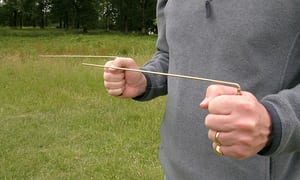By Paul Kieniewicz

A series of recent articles in the Guardian, expressed a measure of outrage that many water companies in the UK today still employ dowsers to locate underground pipes or leaks. The writers described dowsing as pseudoscience, a “medieval practice”, essentially witchcraft. The articles inspired an outpouring of protest in letters to the Guardian’s editor, and on social media defending the practice. Their general view was that water companies are not flaky outfits. Locating underground leaks and underground pipes is a difficult task, and water companies will use any technique that they think will work. Evidently, with many of those companies, dowsing has some sort of track record, though it may not have one in controlled laboratory tests. Such tests often showed that dowsing results are no better than chance.
I have tried my hand at dowsing, with mixed results. I’m not much good at locating hidden objects or water, but that doesn’t mean that other people are not good at it. I restrict my activities to detecting medical conditions, such as headaches and minor ailments, and then only in people I know. I tend to use a pendulum, that I’ve trained to move in a straight line when something is detected, in circles otherwise. This is not witchcraft, but a natural ability we all have in some measure. The hand is naturally sensitive to the body’s electric field, and any anomaly in that field can be picked up, as a sensation like tingling, heat or cold. Practitioners of Therapeutic Touch use this technique in their practice. What the pendulum does is to magnify small, hand movement even before we are conscious of them. You can train a pendulum to go any way to want, to respond to your reaction. I’m not entirely sure that the hand is responding only to the body’s electric field. Perhaps there’s an intuition that more easily explains why the hand pauses cover the correct location of pain, while the pendulum carries out its appropriate gyrations. The operator may be factoring in many different feelings that he/she is unconscious of. We are not (thank God) totally rational, but we do have an instinctual nature that we constantly use to great benefit. Ask a member of Human Resources who is interviewing a candidate for work, how they arrive at a decision. Often, it’s that intangible factor that they can’t easily explain.

I suggest that water dowsing works in a similar way to what I have just described. As many writers have pointed out, the movement of a twig is most likely controlled by involuntary muscle spasms of the operator, the well-studied ideomotor effect, But that doesn’t mean that dowsing doesn’t work, or that it is witchcraft. The operator is responding to a subconscious impulse. Maybe there’s also a discolouration of the ground, a change in vegetation that he or she isn’t even aware of. Or maybe — it’s something in the air.
Why the outrage? Clearly the authors of the original articles were disturbed that water dowsing is still used by water companies. The reason can’t be, as they stated, that customers’ money is being wasted. Were the dowsers employed pro bono, the outcry would be no less. Their use of the term “witchcraft” suggests a possible reason. I believe that the connection is the subconscious mind. We would like to believe that we behave like programmed, rational computers, relying on empirical, measurable data. In our culture, we have placed a supreme importance on analytical thought as the only tool for solving complex problems. However, our experience shows that though thought can build rockets to Mars, there are many classes of problems where thought doesn’t work well. Finding a life partner, hiring an employee, solving relationship issues, and yes, finding even a water leak. We have other abilities that work well in those situations, and we can’t always explain how those work. They involve that aspect of our personality that is largely unknown to us, which we call the subconscious. Our rational self, like the God of the Old Testament, believes that “there is no other God but I”. It is understandably outraged to hear that it may not have all the answers. That there may be an approach to truth that does not involve the rational “I”. It’s first line of defense is to deny that the subconscious exists, or that it has a meaningful role in our lives.
For over twenty years I prospected for oil and gas, with a measure of success. Of eight wells drilled, six were successful. I never used dowsing. I used standard geophysical techniques such a seismic data, gravity and magnetics, and well data. But the information was never enough to find oil. Some experience and intuition was required to make sense of conflicting information. There was also an ability that we geologists called, “a prospecting sense”. Some geologists could hone in on a prospect by its “smell”. They could find prospects faster than anyone else, even though everyone was looking at the same information. The chance of drilling a successful well was often no better than 50-50. But those people beat the chances.
I suggest that we have a bit more respect for water prospectors, and experienced water dowsers who know their craft. Even though we may not understand how dowsing works, it is undoubtedly real, and in the right hands can benefit us greatly.





8 thoughts on “Witchcraft in the Water Works”
Dear Paul
Many thanks for this interesting article. There are a few things I could add about this incident that may be of interest. After the scientist became incensed at the sight of water company engineers dowsing on her parents’ land, she wrote to the 12 water companies asking whether they used dowsing. 10 of the 12 replied that they did (evidently the replies were sent by people at a fairly junior level). After she had publicized the matter in the Guardian and elsewhere, the companies all sought to minimize what they had said earlier. Their use of dowsing was all very minimal, they all had the latest equipment which they relied on much more etc. etc.
There followed a programme on BBC radio 2 presented by Jeremy Vine. The scientist was there and a friend of mine from London and Thameside Dowsers, John Baker, also took part (I think by telephone). A studio assistant had set up a test. There were 3 containers, one of which contained water. The other 2 did not. Jeremy Vine was to see if he could find out the right container by dowsing, though he had never dowsed before. The scientist was contemptuous, saying she was going to laugh herself to death etc. John quietly gave a bit of instruction to Jeremy on how he should dowse, hold the rods etc. Jeremy dowsed over the 3 containers, and over one of them the rods moved. The tops of the containers were removed and the one over which the rods moved was found to be the one that contained the water. The scientist was quiet after that, but after the programme had ended she was apparently very rude to the studio assistant, accusing her of giving subtle signs to Jeremy. The studio assistant in turn became cross about the accusation.
It is in fact quite common for people to be successful using dowsing rods the first time they try. From what you say you may also have been a more successful dowser than you realize. You mention that when you prospected for oil and gas you never used dowsing. Are you quite sure about that? Could a “prospecting sense” be anything other than dowsing? It should be remembered that fundamentally dowsing is not dependent on the use of rods or pendulums. There is also “deviceless dowsing”, when you pick up energies with your hands or by bodily sensing or movements without using an implement. In fact this was how I first got into dowsing in 1981. I was with friends up at the Rollright Stones, a stone circle in the Cotswolds. I found that, at certain points around the King’s Stone (a standing stone near the circle) my hands tingled. It was quite a eureka moment.
Best wishes
Bryan Hammersley
Dear Bryan
Thank you for your comment. Please forgive the long silence. I’m travelling a fair bit these days. As you no doubt know, sceptics are rarely convinced by evidence. This is also largely true in various scientific disciplines. It usually takes a very large body of evidence to make people think twice about their preconceived ideas. Once those are established they don’t change, especially later in life.
Thank you for your comment on the prospecting nose. Maybe it’s a form of dowsing. It’s worth exploring.
All the best
Paul
On November 23rd I shared that Guardian article on Facebook (https://www.facebook.com/mousethatspins/) with the comment “Here is a journalist unhappy about what is described as “mediaeval witchcraft practices”. Is the Guardian aware that accusing people of witchcraft practices is itself somewhat mediaeval? And at the end they ask me to pay to support their witch hunt.” I was astonished to see the posting went out and was shared to reach over 22 thousand people!
Thank you for sharing the article, Lionel. I wouldn’t be too hard on the Guardian. They usually publish very responsible journalism. The letters to the editor, I referenced, show that many readers objected to the tone of the article. They didn’t have to use disparaging words such as “witchcraft” and “medieval”. Thanks for your reply.
Paul
Yes, i was brought up with “The Manchester Guardian” since childhood and retained a soft spot for the journal. I still admire their crusading spirit, it is just that crusades can sometimes cause collateral damage! More neo-pagans support the Guardian than some of their writers would care to admit.
Dear Paul
A couple of supportive comments.
1) A close friend of mine from Australia trained as an agronomist, in the real world of trying to grow things in a harsh Australian climate. No room for bullshit or bullshitters. Yet they all trained as dowsers, and regularly used that skill.
2) I do believe there is a scientific basis, that could be tested by scientists willing to break out of intellectual phase lock.
– All flowing water is flowing in the earth’s magnetic field.
– All ground water (usually) contains soluble material, is ionised to a greater or lesser extend, and therefore it is conductive.
– By definition, when any conductive material moves through a magnetic field, it will generate an electromagnetic current.
– Fleming’s Right-hand rule applies.
The only questions then are
(a) how strong that field is, and
(b) how sensitive individual people are to the electromagnetic field.
We are all sensitive to some extent. Some are naturally more sensitive than others, but it is a sensitivity that can be harnessed or acquired. Like being a trained singer, or a martial artist who exercises control and demonstrates the art.
Regards
Keith
Thank you for your comments, Keith. I agree. You may want to look at work that Persinger and his students at Laurentian University have been doing the past few years on our sensitivity to the Earth’s field. They appear to have demonstrated that we are sensitive to the Earth’s field. When its is disturbed as a result of magnetic storms, our ability to sense what others are thinking/feeling is impaired.
Hi Paul, thanks for mentioning Persinger. I note that it builds on (if not repeats) the earlier work of Robert Becker with “The Body Electric” etc.